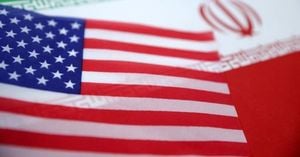NORTH ADAMS — The recent executive order issued by President Donald Trump, which seeks to streamline and potentially eliminate diversity, equity, and inclusion (DEI) programs from college campuses, has sent shockwaves across academic institutions nationwide.
At the Massachusetts College of Liberal Arts (MCLA), the reaction has been quite the opposite. “We’re leaning in and expending,” stated MCLA President James Birge, asserting the institution's commitment to its DEI programs. “We’re continuing to implement the Board of Higher Education’s strategic plan for racial equity. We value diversity, equity, inclusion, and belonging.”
Trump’s executive order is part of his broader educational strategy aimed at decentralizing authority and shifting power over educational policies to state governments. The repercussions of such orders have resulted not only in confusion but also prompted colleges like MCLA to reinforce their diversity initiatives going forward.
These DEI initiatives can include programs aimed at student support, needs-based financial aid, scholarships for underrepresented groups, and educational frameworks addressing race, gender, and cultural diversity. Berkshire Community College (BCC) also voiced its determination to continue DEI efforts without interruption. “Academic freedom is the cornerstone of liberal arts education,” BCC President Ellen Kennedy emphasized, highlighting their mission to nurture inclusive environments.
On the other hand, the University of Cincinnati appears to be at the center of Trump’s recent scrutiny, along with other educational institutions from Ohio and Kentucky, as potential targets for investigations aimed at halting DEI practices. The University of Cincinnati boasts an endowment of approximately $1.8 billion, attracting federal attention consistent with Trump’s mandate aimed at identifying colleges exceeding the $1 billion threshold for civil compliance investigations.
Universities like Ohio State University, founded its Office of Diversity and Inclusion as early as 1970, focusing on enhancing the recruitment and retention of minority groups. According to their website, decades of research suggest diversity fosters improved communication and decision-making across various identities. Nevertheless, Trump’s administration has branded similar initiatives as conduits for what they describe as “dangerous, demeaning, and immoral preferences” motivated by skin color and gender.
Despite the contentious climate, college leaders remain resolute. MCLA's Birge declared, “Trump's administration can’t make lawful DEI practices unlawful.” He feels emboldened by the support from Massachusetts State Attorney General Andrea Joy Campbell, who has joined with 23 other state attorneys general to combat the federal modifications of funding associated with DEI programs.
“We’re privileged to be in Massachusetts, where we value things like public higher education and diversity,” Birge remarked.
The ambiguity surrounding Trump's intentions has left college officials pondering future steps; for now, they intend to continue operations as usual. BCC's spokesperson echoed this sentiment, stating they’re committed to fostering inclusivity per their institutional values.
“Our faculty has academic freedom, and we’re not going to change our values,” said Jonah Sykes, emphasizing BCC’s commitment to multicultural associations and clubs on campus.
Create uncertainty looms large, as institutions await clarification on the ramifications of Trump's order. NEVILLE PINTO, President of the University of Cincinnati, reached out to faculty and staff underscoring the importance of staying informed about “state and federal policy announcements” impacting higher education.
“We recognize many have concerns, and we hear you,” Pinto stated, illustrating the kind of open dialogue academic institutions are striving for as tensions rise over policy compliance.
Meanwhile, the University of Kentucky and Ohio State University representatives stated they would adhere to legal mandates whilst monitoring the shifting political climate. Each institution expressed their dedication to meeting the challenging moment without prejudicing the integrity of their educational missions.
Moving forward, college leaders around the nation remain committed to their foundational values, particularly those centered on fostering diversity and inclusion. The fight over DEI programs is far from over, as educational institutions grapple with balancing compliance with their core values.
Calls for clarity and stability resonate throughout the academic community as educational leaders sense the potential for dramatic variations across state lines related to diversity efforts. Despite the tumultuous backdrop, colleges like MCLA are steadfastly prioritizing their DEI agendas, cautioning against political decisions influencing educational policies.
The forthcoming months will be pivotal as academic institutions navigate this juxtaposition of federal pressure and institutional values. The outcomes of Trump’s order will undoubtedly serve as defining moments not just for DEI programs but for the underlying mission of fostering inclusivity within America’s education systems.



